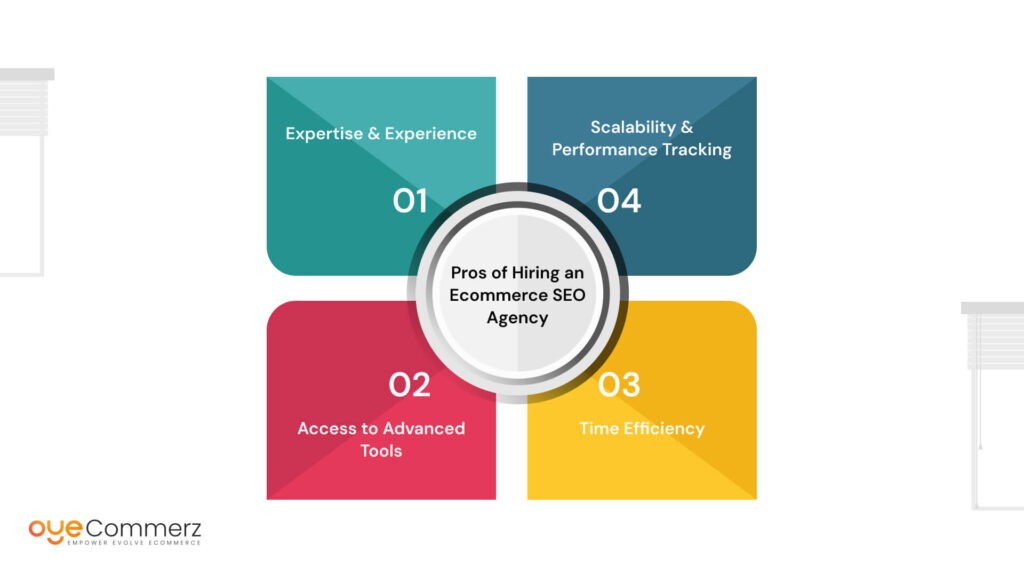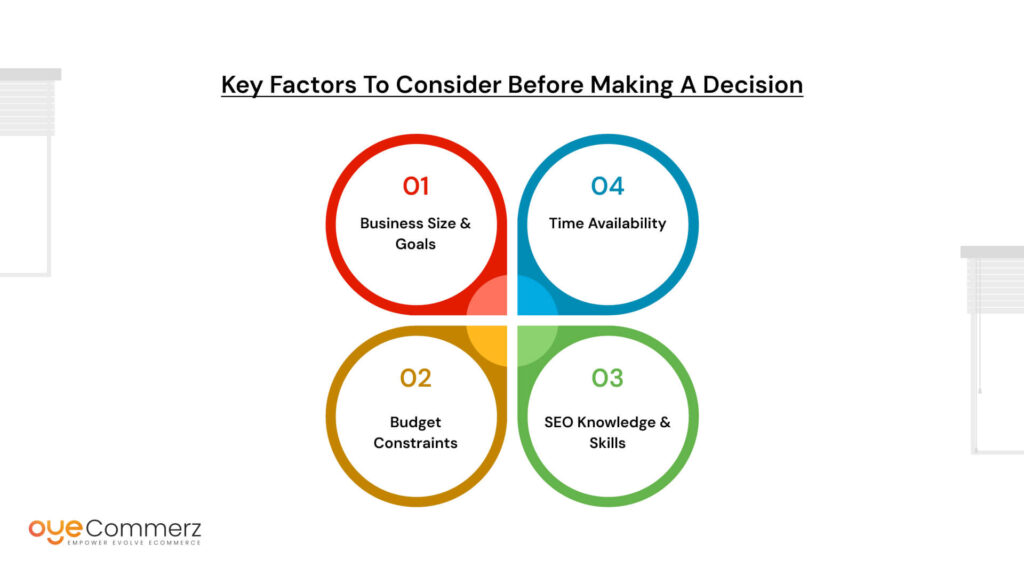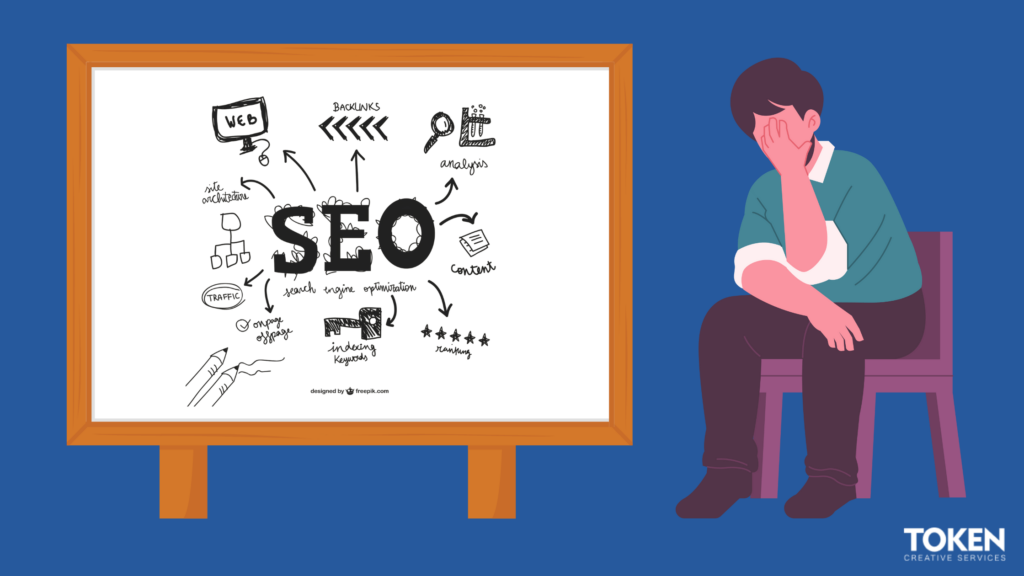Hiring an Ecommerce SEO Agency vs. Doing It Yourself
Have you ever wondered if hiring an eCommerce SEO agency is worth it, or if you can handle it yourself? It’s a big decision—one that can impact your online sales, traffic, and brand visibility.
SEO isn’t just about ranking higher on Google; it’s about attracting the right customers, increasing conversions, and staying ahead of the competition. In fact, businesses that invest in expert SEO services see an average organic traffic increase of 200% within a year. But does that mean hiring an agency is the right move for you?
If you’re torn between outsourcing SEO or managing it in-house, this blog will break it down for you. We’ll explore the pros and cons of each approach, key factors to consider, and how to decide what’s best for your business. Let’s dive in!
Understanding Ecommerce SEO
Understanding Ecommerce SEO
Ecommerce SEO is the process of optimizing your online store to rank higher on search engines like Google. The better your rankings, the more organic (free) traffic you attract, which means more potential customers browsing and buying from your store. But SEO isn’t just about stuffing keywords onto a webpage—it’s a combination of strategies that work together to improve visibility, user experience, and conversions.
Let’s break down the key components of eCommerce SEO and why they matter:
1. Technical SEO: Building a Strong Foundation
Think of technical SEO as the behind-the-scenes work that makes your website easy for search engines to crawl and index. Without it, even the best content won’t rank well. Here’s what it includes:
- Site Speed – A slow-loading website drives customers away. Optimizing images, using a fast hosting provider, and minimizing code can speed things up.
- Mobile Optimization – More than half of all online shopping happens on mobile devices. If your store isn’t mobile-friendly, you’re losing sales.
- Site Structure & Navigation – Clear categories, organized product pages, and a logical menu make it easier for customers (and Google) to find what they need.
- Secure & Accessible Website – HTTPS encryption builds trust and ensures your site is safe for transactions.
2. On-Page SEO: Optimizing Your Content
On-page SEO is what you do directly on your website to improve rankings. This includes:
- Keyword Optimization – Using the right keywords naturally in product titles, descriptions, blogs, and meta tags.
- High-Quality Content – Informative product descriptions, engaging blogs, and helpful guides can boost rankings and keep visitors on your site longer.
- User Experience (UX) Design – Simple navigation, clear call-to-action buttons, and fast checkout processes improve customer satisfaction and conversion rates.
- Optimized Images & Videos – Using alt text, compressing images, and adding engaging visuals helps with both SEO and user engagement.
3. Off-Page SEO: Building Authority
Off-page SEO is everything that happens outside your website to increase credibility and rankings. It includes:
- Backlinks – When other reputable websites link to your store, search engines see it as a sign of trust.
- Social Media Signals – Sharing content and engaging with audiences on social platforms can drive traffic and improve brand visibility.
- Influencer & PR Collaborations – Partnering with influencers or getting featured on popular sites can boost awareness and credibility.
Why SEO Matters for Ecommerce Growth
SEO isn’t just about rankings—it directly impacts sales and brand visibility. Studies show that 68% of online experiences start with a search engine, meaning if your store isn’t optimized, you’re missing out on valuable traffic. A well-executed SEO strategy helps you:
- Get more organic traffic without spending a fortune on ads.
- Attract high-intent customers actively searching for your products.
- Build brand trust and credibility by appearing on top search results.
- Improve long-term growth with consistent traffic and sales.
Hiring an Ecommerce SEO Agency: Pros and Cons
Running an eCommerce store is already a full-time job, and adding SEO to the mix can be overwhelming. That’s why many businesses turn to professional SEO agencies to handle their online visibility and rankings. But is hiring an agency the right move for you? Let’s break down the pros and cons.

Pros of Hiring an Ecommerce SEO Agency
1. Expertise & Experience
SEO agencies specialize in helping businesses rank higher on search engines. They know what works, what doesn’t, and how to navigate constant algorithm updates. Instead of spending months (or years) figuring out SEO on your own, an agency brings proven strategies to the table, helping you grow faster.
2. Access to Advanced Tools
SEO isn’t just about keywords—it requires deep data analysis, competitor research, and technical optimizations. Agencies have access to premium SEO tools like Ahrefs, SEMrush, and Moz, which provide insights into your website performance, backlink strategy, and keyword rankings. These tools are expensive for individual users but come as part of the package when you hire an agency.
3. Time Efficiency
As an entrepreneur, your time is better spent on scaling your business, managing products, and improving customer experience. SEO is time-consuming—it requires continuous optimization, content creation, and data analysis. By outsourcing SEO to an agency, you free up your time while experts handle the technical work.
4. Scalability & Performance Tracking
A good SEO agency doesn’t just improve rankings; they provide data-driven insights, detailed reports, and strategies that grow with your business. They track performance metrics like organic traffic, conversion rates, and keyword rankings, allowing you to see what’s working and adjust accordingly.
Cons of Hiring an Ecommerce SEO Agency
1. Cost
Hiring an SEO agency isn’t cheap, especially for small businesses. The cost depends on the agency’s expertise, the level of service you need, and the complexity of your website. While SEO is a long-term investment, businesses on a tight budget may struggle to afford a full-service agency.
2. Less Control
When you hire an agency, you’re handing over a crucial part of your business to an external team. While they bring expertise, you might have less control over the exact strategies being used. If you prefer a hands-on approach, outsourcing SEO might feel a bit disconnected.
3. Finding the Right Agency
Not all SEO agencies deliver results. Some use outdated strategies, while others focus more on sales than actual performance. Choosing the wrong agency can waste time and money. That’s why it’s important to do thorough research, check client reviews, and ask for case studies before committing.
Doing Ecommerce SEO Yourself: Pros and Cons
If you’re an entrepreneur who likes to take matters into your own hands, handling eCommerce SEO yourself might seem like an attractive option. It allows you to stay in control, save money, and develop valuable skills. But is it the right choice for your business? Let’s dive into the pros and cons of managing SEO on your own.
Pros of DIY Ecommerce SEO
1. Cost Savings
One of the biggest advantages of doing SEO yourself is avoiding expensive agency fees. Instead of paying for professional services, you only need to invest in essential tools, courses, and resources to learn the process. This can be a great option for startups or businesses with tight budgets looking for a cost-effective way to grow online.
2. Full Control
When you handle SEO in-house, you have complete control over your strategy. You decide which keywords to target, what content to create, and how to optimize your website. This level of involvement allows you to align SEO efforts with your brand’s vision and long-term business goals.
3. Learning Opportunity
SEO is a valuable skill, and by learning it yourself, you gain long-term benefits. Understanding how search engines work, how to optimize content, and how to analyze performance metrics can help you make informed decisions for your business. The knowledge you build today can save you money in the future and give you an edge over competitors.
Cons of DIY Ecommerce SEO
1. Steep Learning Curve
SEO isn’t something you master overnight. Search engine algorithms are constantly evolving, and staying updated requires continuous learning. From technical SEO and keyword research to backlink strategies and content optimization, there’s a lot to grasp. Without prior experience, mistakes can slow down your progress and even harm your website’s rankings.
2. Time-Intensive
SEO isn’t a one-time task—it’s an ongoing process that requires consistent effort. Writing optimized content, fixing technical issues, analyzing performance data, and building backlinks take time. If you’re already managing inventory, customer service, and marketing, adding SEO to your workload can be overwhelming.
3. Limited Access to Premium Tools
Professional SEO tools like Ahrefs, SEMrush, and Moz offer deep insights into keyword research, competitor analysis, and backlink tracking—but they come at a high cost. While free tools like Google Search Console and Ubersuggest can help, they may not provide the level of detail needed to compete with well-optimized eCommerce stores.
Also Read: E-Commerce SEO Checklist – A Practical Step-By-Step Checklist
Key Factors to Consider Before Making a Decision

Choosing between hiring an eCommerce SEO agency and doing it yourself isn’t a one-size-fits-all decision. It depends on multiple factors, including your business goals, budget, skill level, and available time. Before you decide, here’s what you need to consider.
1. Business Size & Goals
Your business size plays a huge role in this decision. If you’re running a small online store with minimal competition, learning and managing SEO yourself might be feasible. However, if you’re scaling quickly or competing in a saturated market, an agency can help accelerate growth with advanced strategies and industry expertise. Consider where you want your business to be in the next few years—can you afford to experiment, or do you need results faster?
2. Budget Constraints
SEO is an investment, whether you hire an agency or do it yourself. Hiring an agency comes with monthly fees, but it provides expert execution and measurable results. On the other hand, DIY SEO eliminates agency costs but requires investment in premium SEO tools, training courses, and your own time. If your budget is tight, you might start with DIY and transition to an agency as your business grows.
3. SEO Knowledge & Skills
Do you or your team have SEO experience? If not, are you willing to learn? SEO involves technical optimization, keyword research, content strategy, and data analysis. If you enjoy digital marketing and have time to experiment, you might find DIY SEO rewarding. However, if SEO feels overwhelming, an agency can handle the complexities while you focus on running your business.
4. Time Availability
SEO isn’t a quick fix—it requires ongoing effort. Can you consistently optimize your site, analyze performance, and stay updated with algorithm changes? If your schedule is already packed with managing operations, product development, and customer service, outsourcing SEO might be the more practical choice.
When to Hire an Ecommerce SEO Agency
Hiring an eCommerce SEO agency isn’t just for big brands—it’s for any business that wants expert-driven growth, faster results, and a hands-off approach to SEO. If you’re debating whether outsourcing is the right move, here are the key signs that it’s time to bring in the professionals.
1. You Need Rapid Results and High-Level Expertise
SEO is a long game, but with the right expertise, you can accelerate the process. If your business needs quick improvements in search rankings, organic traffic, and conversions, an agency can implement proven strategies tailored to your niche. Instead of experimenting through trial and error, you’ll get a data-driven approach that delivers measurable results.
2. Your Business Has a Budget for Professional SEO Services
SEO agencies charge for their expertise, premium tools, and continuous optimization. If your business can allocate a budget for professional services, you’ll save time and avoid the learning curve. While DIY SEO can be cost-effective, hiring an agency ensures you’re getting the best possible return on investment without the risk of costly mistakes.
3. You Lack In-House SEO Knowledge or Time
SEO isn’t just about adding keywords to your website—it involves technical fixes, content strategy, link building, and competitor analysis. If you or your team don’t have the necessary skills or the time to learn, outsourcing is a smart move. An agency takes care of everything while you focus on scaling your business.
4. You’re Struggling to Increase Organic Traffic and Conversions
If your website isn’t ranking well on search engines despite your efforts, it might be time for expert intervention. SEO agencies have access to premium tools, advanced analytics, and years of experience to identify roadblocks and implement strategies that drive real results.
When to Do It Yourself
Managing eCommerce SEO on your own can be a smart move if you have the time, willingness to learn, and a tight budget. While SEO requires patience and consistency, doing it yourself can pay off in the long run. Here’s when handling SEO in-house makes sense.
1. You’re a Startup or Small Business with Limited Funds
If you’re just starting and every dollar counts, DIY SEO might be the best route. Hiring an agency can be expensive, and if you’re operating on a lean budget, learning the basics yourself can help you grow without breaking the bank. There are plenty of free and affordable SEO tools, courses, and guides that can help you get started.
2. You Want to Learn SEO and Build Long-Term Expertise
SEO is an essential digital skill, and if you’re willing to invest time in learning, it can give you a competitive edge. By mastering SEO yourself, you can gain full control over your website’s optimization and make strategic decisions based on data. Plus, having SEO knowledge can help you even if you eventually hire an agency—you’ll know what to expect and how to measure success.
3. You Have an In-House Team Dedicated to SEO
If your business already has a marketing team with SEO knowledge, handling it in-house can be efficient. With the right training and tools, your team can execute SEO strategies, monitor performance, and make adjustments as needed. This approach keeps everything under your control while leveraging internal resources.
4. You’re Comfortable Using SEO Tools and Managing Optimization Tasks
If you enjoy working with data, testing strategies, and tracking performance, DIY SEO could be a great fit. Platforms like Google Analytics, Google Search Console, and keyword research tools can provide valuable insights. If you’re tech-savvy and enjoy problem-solving, managing SEO yourself can be both cost-effective and rewarding.
Hybrid Approach: Best of Both Worlds
If you’re torn between hiring an eCommerce SEO agency and doing it yourself, the hybrid approach could offer the best of both worlds. This strategy lets you take advantage of professional expertise while keeping certain tasks in-house, giving you the flexibility to scale as your business grows. Here’s how you can make this approach work for you.
1. Hire an Agency for Strategy and Guidance
If you have the time and resources to handle some aspects of SEO but need expert input on strategy, hiring an agency for guidance is a smart move. Agencies can provide a roadmap tailored to your business, focusing on things like keyword research, content strategy, and overall SEO direction. This allows you to execute the plan in-house while benefiting from the agency’s industry knowledge and insights.
2. Use Consulting Services Rather Than Full-Service SEO
If you’re not ready to commit to a full-service SEO agency, consider hiring a consultant. SEO consultants can give you one-on-one advice on how to optimize your website, help with troubleshooting issues, and provide support when needed. This option is more affordable than hiring a full team but still gives you access to high-level expertise when you need it most.
3. Focus on Learning Basic SEO While Outsourcing Technical Tasks
While you work on mastering content creation, keyword research, and on-page optimization, you can outsource more technical aspects of SEO, such as site audits, speed optimization, and mobile responsiveness. Agencies specialize in these areas and can make sure your site is technically sound. This hybrid method allows you to take care of the less complex tasks while experts handle the more specialized work.
Conclusion
When it comes to eCommerce SEO, the decision to hire an agency or go DIY depends on your business goals, budget, and resources. Agencies bring expertise, advanced tools, and time-saving strategies, making them a great choice for businesses looking for fast results and high-level optimization. On the other hand, doing SEO yourself is cost-effective and offers full control, but it requires time, learning, and a steep learning curve.
For startups or businesses on a budget, DIY SEO might be the way to go, but if you’re aiming for rapid growth or struggling with traffic and conversions, investing in an SEO agency can pay off.
No matter what path you choose, remember that SEO is a long-term investment that can transform your business.
Need expert eCommerce SEO? Contact Token Cs today and watch your business grow!
Related Articles
Why DIY SEO Fails Most Business Owners (And What to Do Instead)
Freelancer vs. SEO Agency: Who Should You Trust with Your Website?
Let Us help you!
Have a question for our team? Want to learn more about what we offer? Already know what your company needs and just want to have a conversation with us?
Follow us for more helpful content.
Let Us help you!
Have a question for our team? Want to learn more about what we offer? Already know what your company needs and just want to have a conversation with us?

